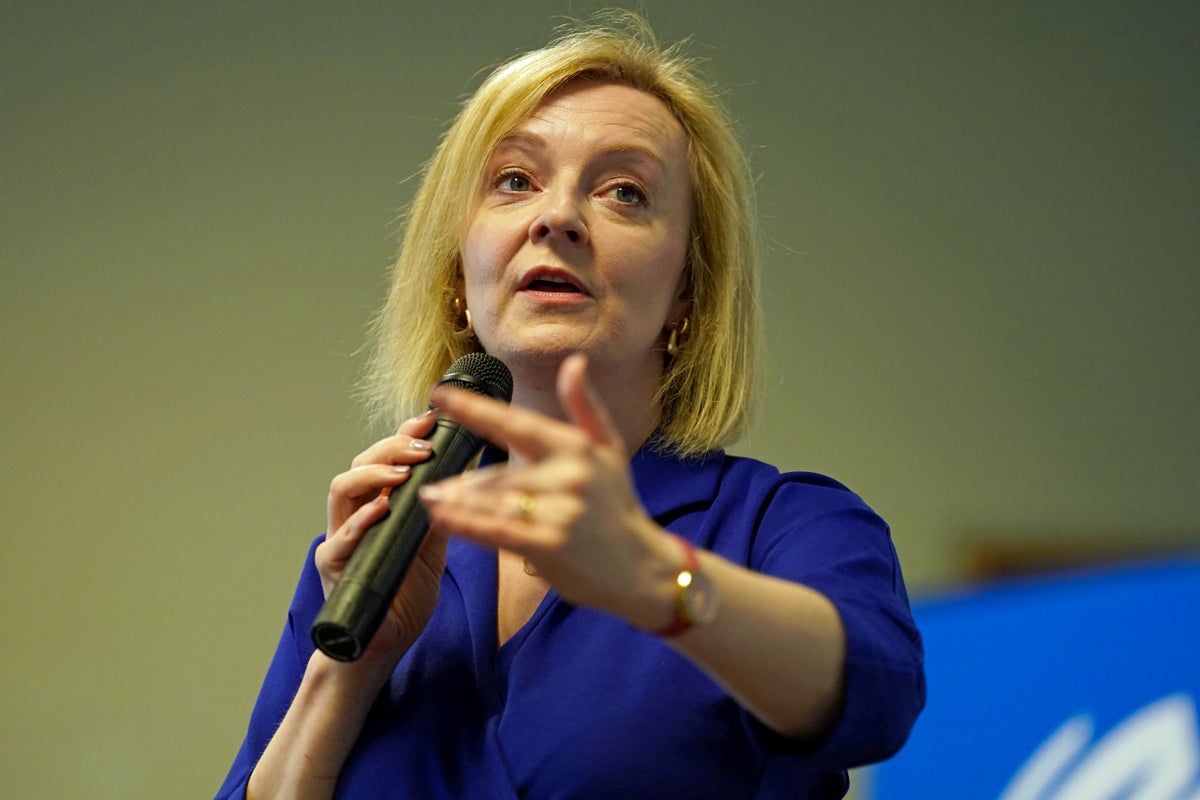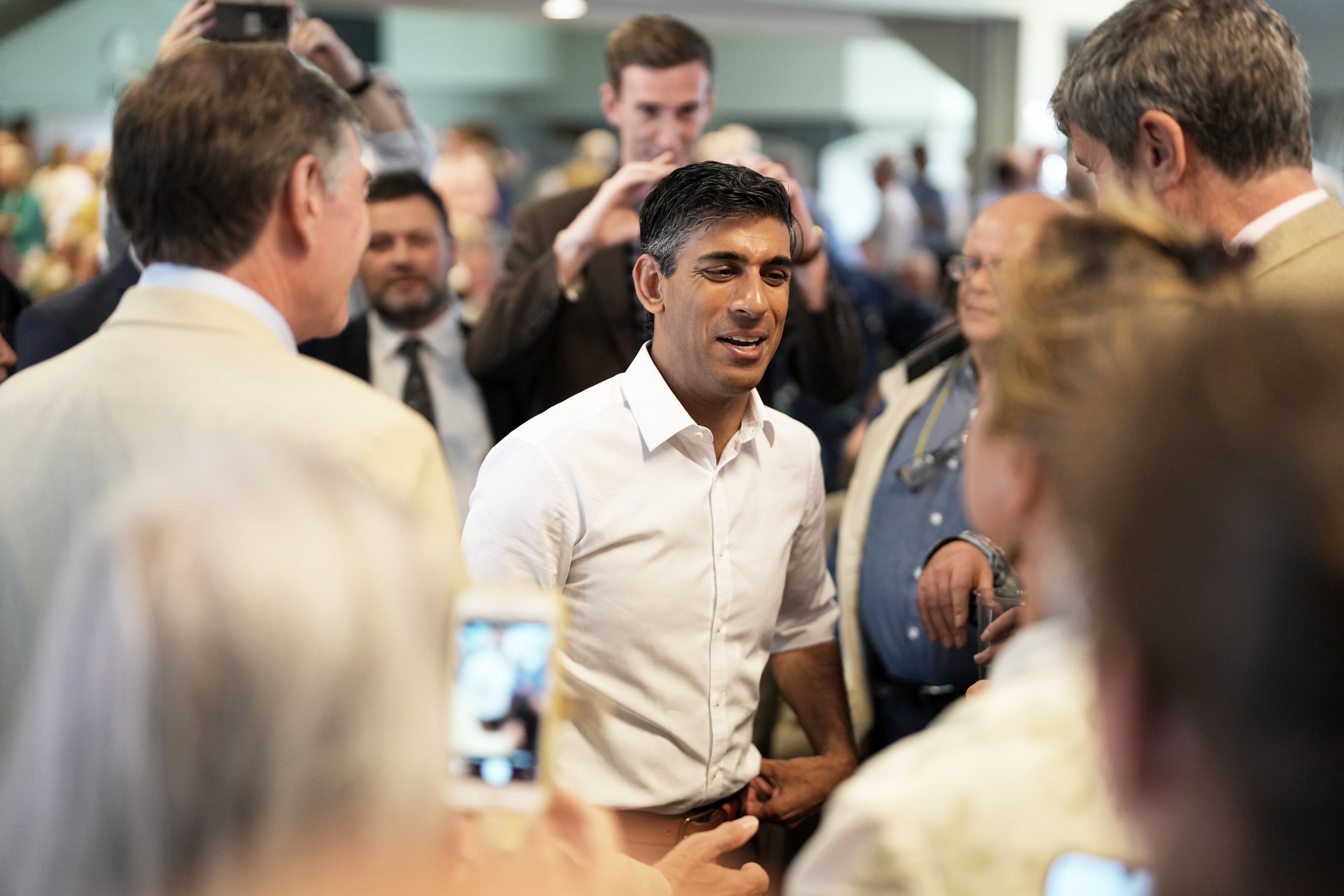
Tory leadership frontrunner Liz Truss insisted she is taking nothing for granted despite a massive opinion poll lead over rival Rishi Sunak.
The former chancellor has a 34-point gap to make up on Ms Truss, the YouGov poll of party members indicates.
But Ms Truss acknowledged there is “still a long way to go” in the contest and she continues to face questions about abandoning a key policy pledge.
The two rivals will appear at the latest hustings event in Cardiff on Wednesday evening and Mr Sunak will hope that a delay in ballot papers being issued due to cyber security concerns can give him time to make up ground on Ms Truss.
The YouGov survey shows 60% of the party members polled between July 29 and August 2 say they intend to vote for the Foreign Secretary, with 26% backing Mr Sunak.
The poll of 1,043 Conservative Party members indicates just 11% do not know who they will vote for, while 2% said they will not take part in the contest.
A further indication of her dominance came with a survey of 1,003 members by the ConservativeHome website, which had 58% backing Ms Truss to Mr Sunak’s 26%.
Asked if she is looking forward to being prime minister, Ms Truss said: “I am not taking anything for granted. There is still a long way to go in this leadership election.”
Despite the poll boost, her campaign has endured a rocky period as she abandoned an £8.8 billion policy pledge to cut the public sector wage bill by paying workers in cheaper areas of the country less than in more expensive parts – claiming it had been “misrepresented”.
But she refused to set out why the policy is being abandoned entirely if the problem is merely one of presentation.
Critics of the plan had claimed it would go against the Government’s levelling up agenda by cutting wages in more deprived areas of the country, although Ms Truss insisted it was never meant to impact people’s current pay rates.
The information put out by her campaign said the potential £8.8 billion saving from the policy depended on it being “adopted for all public sector workers in the long term”.
Ms Truss said: “The policy that I put forward was misrepresented.
“I wanted to make sure that our important frontline workers like doctors and teachers weren’t worried, that’s why I cancelled the policy.
“I did it straight away, I was decisive and I was honest with the public about what I was doing.”
The first postal votes in the contest were due to be submitted this week, but the party delayed sending ballots out following advice from cyber security experts.
The party has made changes to its process on the advice of the National Cyber Security Centre (NCSC), part of GCHQ, following warnings that hackers could change members’ votes.
The ballots had been due to be sent out from Monday but could now arrive as late as Thursday August 11.
A Conservative spokesman said: “We have consulted with the NCSC throughout this process and have decided to enhance security around the ballot process.
“Eligible members will start receiving ballot packs this week.”
An NCSC spokesman said: “Defending UK democratic and electoral processes is a priority for the NCSC and we work closely with all parliamentary political parties, local authorities and MPs to provide cyber security guidance and support.

“As you would expect from the UK’s national cyber security authority, we provided advice to the Conservative Party on security considerations for online leadership voting.”
The Daily Telegraph said it understood there was no specific threat from a hostile state and concerns were around the vulnerability of the voting process.
The party has been forced to abandon the plans to let members change their vote if they alter their decision about which candidate to back during the election process, the newspaper reported.
A message sent to members said if they wish to vote online they will have to enter their single-use code and fill in security questions.
If they choose to vote by post, their online code will be deactivated once the ballot is received, “reducing the risk of any fraud”.
The message to members said “it is an offence to vote more than once” – with the threat of withdrawn membership for anyone found to have done so.
Former party treasurer Lord Cruddas of Shoreditch, who has been campaigning to keep Boris Johnson in office, said the leadership contest should be suspended as a result of the cyber security concerns.
In a letter to the party’s board, he said members should then be given a vote on whether to accept Mr Johnson’s resignation.
“If the members vote to keep Boris then there is no need for a leadership campaign and no more cyber security threats,” he said.







